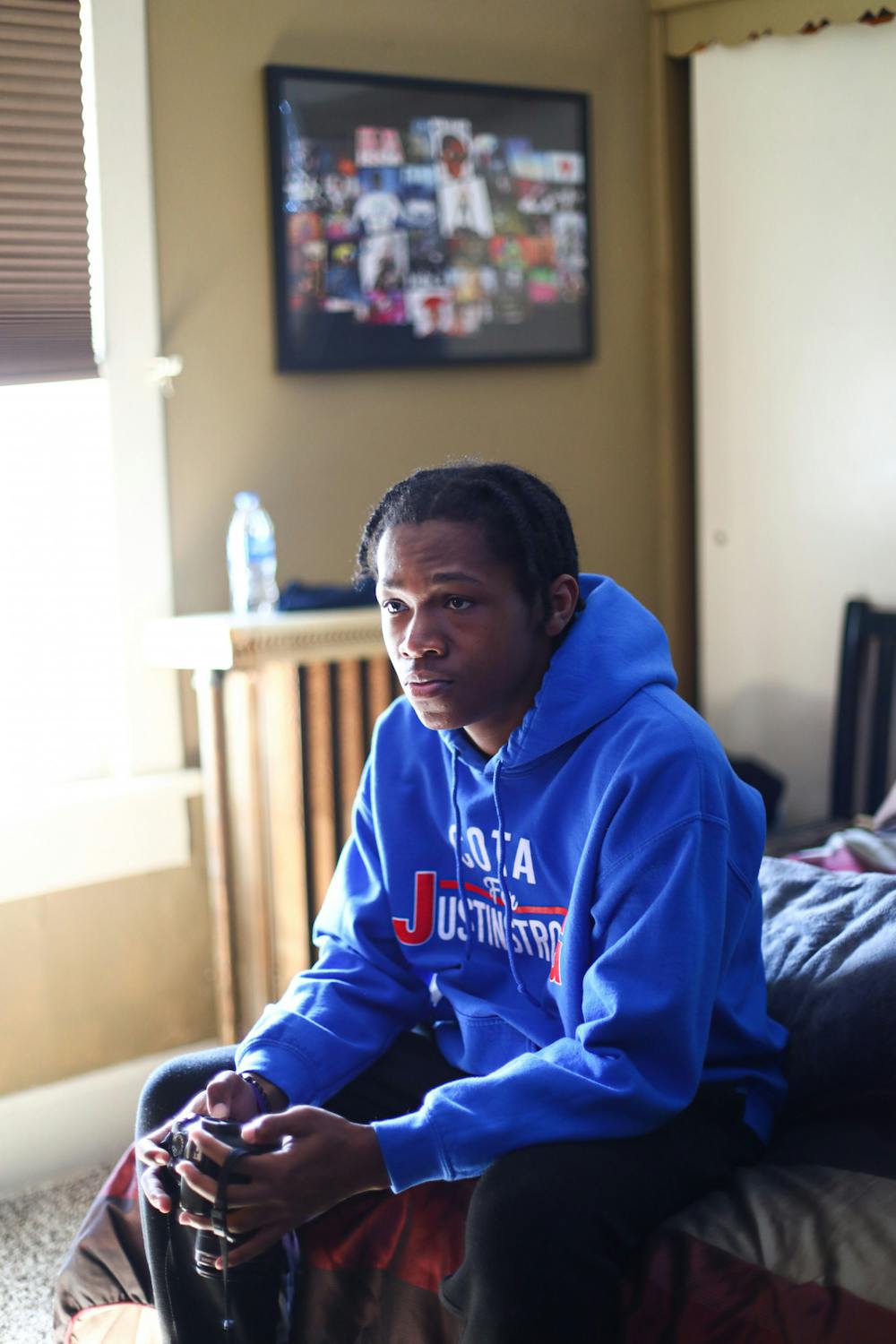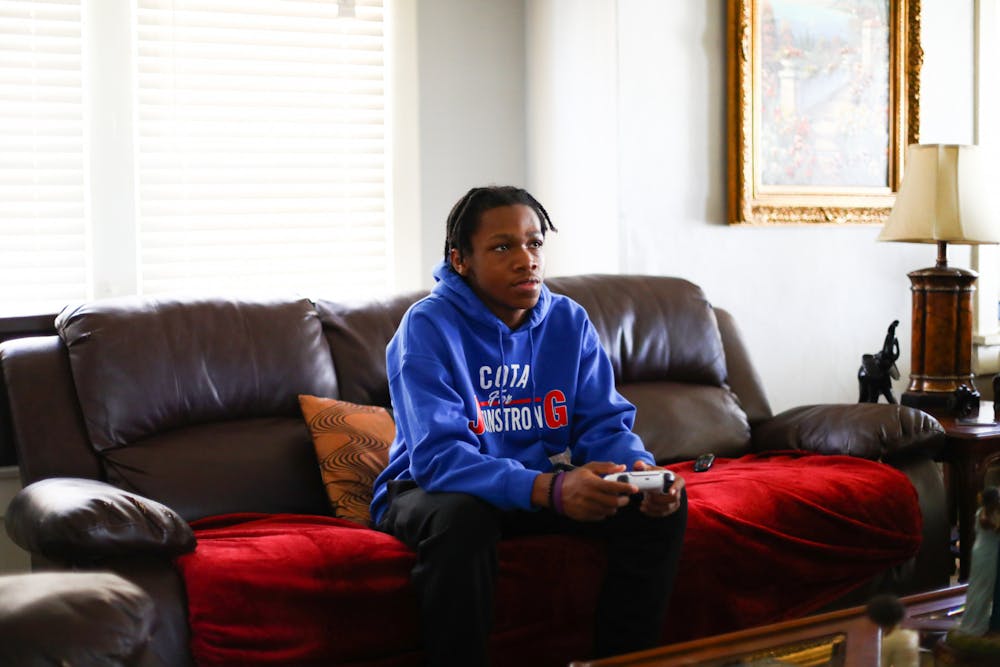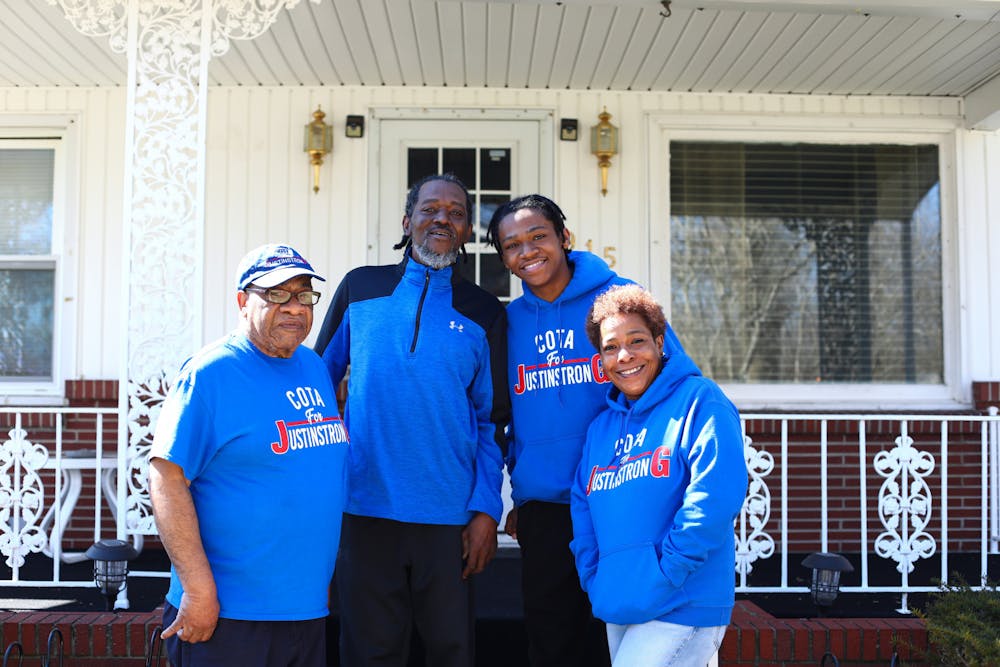In May 2021, things were looking up for Justin Gillespie. He was about to attend Muncie Central High School prom for the first time, his 18th birthday was days away and he was less than a month away from graduating high school.
Gillespie remembered going to lunch at his favorite restaurant, Chick-fil-A, just a few days before prom and ordering chicken nuggets.
After taking the first bite, he threw up instantly. Gillespie thought this was strange, especially because he hadn’t felt sick before eating and didn’t feel sick after vomiting.
His mother, Garnisha Mason, wanted to take him to the hospital right away. She said her “mama bear” instincts kicked in. Gillespie assured her he would be okay, and they returned home.
Shortly thereafter, he began to notice he was gaining an abnormal amount of weight, something he said felt like a 50-pound weight being dropped on his stomach. But May 20, 2021, is when everything changed.
“I was coming from the bathroom, and I got so tired I couldn't even make it to my room. I just dropped on the couch,” Gillespie said.
Gillespie passed out for three minutes. Mason and a cousin of Gillespie’s visiting from Texas, Renee, wanted to take him to the hospital right away, but he insisted he just wanted to go to his bed and get some sleep.
“The next morning, I woke up and my ankles were swollen all the way up to my kneecaps,” Gillespie said. “I chose to go to the hospital immediately, and when I got there, I was there for about three plus hours, [before] they [told me] I had nephrotic syndrome, and my kidneys had failed 75 percent.”
According to the National Institute of Health, fewer than five in 100,000 children worldwide develop nephrotic syndrome each year. Nephrotic syndrome is a kidney disorder that causes your body to pass too much protein in your urine, according to the Mayo Clinic. Kidney failure can be life threatening, depending on the severity, the person’s age and health and how soon it is spotted.
Gary Mason, Gillespie’s grandfather and Garnisha’s father, has been an integral piece of Gillespie’s life since he was born. Tears streamed down Gary’s face multiple times when talking about his grandson’s battle with kidney failure. Not only does he care about his grandson, but he knows what intense medical care is like first hand, being a cancer survivor.
“I couldn't believe it. I was all the way in another world when she said it,” Gary said. “I went through colon cancer, I had colon surgery, and I think this hurt me more than when I had that cancer because he was just 18 years old, and I was 60 years old. I was like, ‘I've lived a long life,’ and I just figured that his life was supposed to be as long as mine, and it really upset me to find out that this was going on.”
Gary said his mindset quickly shifted to doing whatever it took to make sure his grandson had the resources to fight the battle. He called it a blessing to have found the kidney failure as early as they did.
Gillespie was kept in Ball Memorial Hospital in Muncie for six days, until May 27, and he began outpatient dialysis May 29, his 18th birthday. Gillespie said when he was told about his condition, he felt like “the walls were closing in.”

Not only did he have job interviews lined up and a plan to buy a car and find an apartment to rent, but Gillespie missed his senior prom, spent his 18th birthday in dialysis and there was a strong chance he wouldn’t be able to attend his upcoming high school graduation. Calling himself an “average” student, Gillespie said he worked hard his senior year to finish all his credits in March, two months early.
In the first of many “miracles,” he did what he set out to do, walking across the stage to receive his diploma June 4, exactly two weeks after his initial hospital visit.
However, things turned sour again the next day. Gillespie was put back in the hospital, this time initially diagnosed with pneumonia.
“At that time, I was like, ‘Again? I just got out.’ It was like, ‘Whoa, okay,’” Gillespie said. “I think it had a lot to do with the liquid restrictions. I think at the beginning of [the dialysis], I was struggling with that because as a teenager you’ve never been told, ‘You gotta only drink this amount.’ That's just different. Then, you started to learn with my situation, if you don't [stick to the restriction], then you're right back into hospitals.”
He is only allowed to drink 32 ounces of liquid per day because he doesn’t urinate, so if he drinks too much, his kidneys will get backed up. According to the National Health Service (NHS), the dialysis process is intended to, “remove waste products and excess fluid from the blood when the kidneys stop working properly. It often involves diverting blood to a machine to be cleaned.”
Gillespie goes to dialysis at U.S. Renal Care in Muncie three days a week from 6 a.m.-10 a.m., something he said takes an extreme physical toll.
“I’m 19, so being fatigued all the time, it's very different. I'm tired a lot, and I'm not used to it because I've never been like that before,” Gillespie said. “On days I have dialysis, I might have a friend or someone that wants to hang out or something, [and] I'm like, ‘I'm tired, too tired.’ On days I have dialysis, I just don't even leave the house … It's like I have like a meter of how long I have until I just completely shut down, and the moment I shut down, I have to go home and go to sleep immediately.”
Despite this, Garnisha said she constantly hears reports from doctors about how positive Gillespie is with everyone at the facility, patient or staff.
“It's such a blessing, just dealing with them and them telling me, ‘He's such a good kid, and he teaches these old people how to act, and he never complains. He comes in here, and he's such a tough, strong guy,’” Garnisha said.
Gary takes Gillespie to most dialysis appointments and goes to every doctor’s appointment Gillespie has. When Gillespie was a child, Gary made him breakfast and took him to school everyday. He called Gillespie his “right hand man.”
One day, Gillespie’s post-dialysis symptoms were much worse than being tired. Shortly after he got in Gary’s car to leave, Gillespie fell into a seizure.
Gary said he was scared to death, yet he knew what to do because his oldest son had epilepsy. Gillespie was again rushed to the hospital where doctors ran tests on his brain to see if he was epileptic; however, they came back negative.
“After that, I said, ‘There's nothing that’s gonna keep him down.’ He's a very strong kid,” Gary said. “I have to say, he gets it from both his mother and his father because he cares a lot about his father, and he cares a lot about his mother, and they do the world for him. I think more than anything, he wants to blow through this for them.”

Garnisha and Robert Gillespie III, Justin’s father, are separated, yet Justin remains close with each of them. Like Gary, Robert knows all about medical issues.
Robert was involved in a single-car accident prior to Justin’s birth when he slid off the road on an icy night into a transformer. From this, he developed motor dexterity disorder, something he struggles with to this day, using a cane to make things easier on his body.
“My mother used to say, ‘You feel horrible when your children go through [tough situations] because you don't want your children hurt,’” Robert said. “[When Justin was diagnosed with kidney failure], I understood what she meant because that's a horrible feeling. If I could give him my kidney, I’d do it, but I can’t.”
According to The Kidney Transplant Foundation, the wait for a kidney transplant can be as short as a few months or as long as multiple years. The average wait time is three to five years, but it can be even longer in some parts of the United States. According to consumerhealthratings.com, the cost of a kidney transplant is estimated at $442,500 before insurance.
Garnisha said this makes the kidney transplant process frustrating. She said she initially asked the doctor why she couldn’t give her kidney to Justin, and the doctor explained giving a 19-year old a 45-year old kidney wouldn’t make sense.
Justin, of course, shares the same frustration.
“I think the hard thing is there's been certain situations where I've had people sign up to try to donate a kidney, and that didn't work out for whatever reason,” Justin said. “You get caught up sometimes with those types of situations [and] the false hope of like, ‘It might be time.’ Then it didn't work, so then you got to go back to trying to make sure you don't fall back into sadness.”
Justin’s sister-in-law has had a kidney transplant in the past, something Robert said is encouraging as the family continues to hold out hope.
“They told him in January that things should start happening fast after that,” Robert said. “Now it's March, and it’s not as fast as we thought it would be. But by the grace of God, he's okay, he seems to be okay.”

Justin’s hospitalization with pneumonia the day after graduation yielded a result potentially just as grim as kidney failure. The family was told Justin had heart failure, halting his process of getting a kidney transplant because he needed a heart transplant first.
Then, a little over a month ago, another “miracle” came.
“We went back for an appointment after we finally got [his blood pressure] to where it needed to be and took another [test] of his heart, [and] those results came back and it was kind of like a miracle blessing,” Garnisha said. “His heart healed on its own.”
As Justin is back on the waitlist for a kidney transplant, the family is attempting to raise $40,000 in support through in-person and online fundraising. This can be found via the JustinStrong campaign at cota.org.
Justin will turn 20 in a little over two months, and he’s approaching two years dealing with kidney failure. Perhaps the biggest “miracle” of all has been his ability to stay positive throughout the process.
But it didn’t start that way.
“When it all first happened, everyone was very worried about me because it's like I processed it and I understood what was happening, [but] I just wasn't showing it. There weren’t any tears,” Justin said. “There wasn't anything really. It was just kind of [a] shock.”
It wasn’t until a week after the initial hospital visit where he finally broke down. Garnisha remembered Justin offered to take out the trash, and when she said she would take care of it for him, he snapped.
“I was screaming and talking about my life being over and stuff like that, and that was how it was really feeling,” Justin said.
He felt his mother didn’t think he was physically capable after the diagnosis, and when Garnisha saw the outburst, all she did was hug him. She and Gary set him up with counseling immediately after, a resource he has continued to utilize since.
Justin outlined a list of physical changes he’s had to go through, such as being injected with a needle three times a week, having a chip put in his arm for dialysis, having back surgery and having a catheter put in his chest when he first started dialysis.
“It definitely changes who you are as a person, not fully, but just [with] everything you have to go through, all the things people probably won't think about, … there's certain things that I probably wouldn't have now,” Justin said. “I have a therapist now, [and] I probably wouldn't have done that without going through this, because I probably wouldn't have got to that point where I was like, ‘I need help. I don't know what's going on.’”
He said he initially distanced himself from those around him.
“I didn't know who was really there or not, but seeing who's got a shirt, seeing who's been to the foundation and stuff, I think I've kind of figured out who's really there,” Justin said. “You need support going through stuff like this. I'm not super social, but I can say for a fact that without my mom and dad and all the family members around taking me to and from dialysis and just doctor's appointments and stuff like that, [I] wouldn't be able to do any of this to get how far we got now.”
Outside of relationships with those around him, Justin connects to music and uses it to cope. He said there are songs and artists that make him not feel alone in his struggle, such as “4 Your Eyez Only,” by J. Cole.
“I just love listening to music. I think this would be a lot harder without music,” Justin said.

He enjoys hip-hop and rhythm and blues (R&B), and his favorite artists are J. Cole and Drake, who he will see in concert at the Dreamville Festival in North Carolina in April. Justin said he enjoys going to concerts and traveling; however, it’s hard on him physically because he has to keep up with dialysis on the road.
As for other ways to pass the time, Justin said he enjoys playing video games, mainly NFL Madden and NBA2K, and watching sports like basketball and football. In addition to talking through his emotions with his therapist, he’ll sometimes use writing as a coping mechanism.
“I bought a little composition book and just started writing,” Justin said. “There will be times, at night more than anything, when the thoughts start flowing in, so I just start trying to write stuff to calm those thoughts down.”
He wanted to start a YouTube channel with two of his cousins, Avion and Jaidin, before his diagnosis halted things. However, recently, he said he’ll go over to their houses to record videos and podcasts with them, beginning to chase that dream again.
Justin is Garnisha’s only child; however, she said even if she had 17 kids, she’d want all of them to be like Justin.
“Looking at Justin’s strength through everything he's gone through, I know I've done a good job,” Garnisha said. “That's enough for me to focus now on making sure that we're gonna be okay and let him focus on making sure he's gonna be okay.”
She’d want these 17 kids to chase their dreams and not let a physical hindrance be just as much of an emotional one, like Justin. Whether he gets to this headspace through making videos, listening to music, playing video games, watching sports, writing or anything else, Justin said he knows one thing despite all the medical obstacles thrown at him.
He said tThere is light at the end of the tunnel.
“The thing I can say keeps me going is the fact that I don't know when, but I know this will end at some point,” Justin said. “It’s not gonna be a thing that's gonna last forever.”
Contact Kyle Smedley with comments via email at kyle.smedley@bsu.edu or on Twitter @KyleSmedley_.





